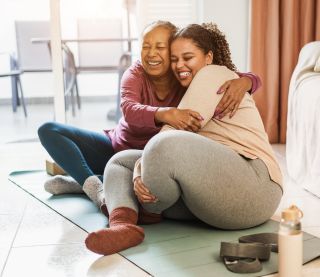Body Image
The Top 5 Body Image Questions of 2023
These are the body image issues that were on everyone's mind.
Posted December 20, 2023 Reviewed by Gary Drevitch
Key points
- Even people with a healthy body image are not satisfied with their body and appearance every day.
- Adults can help young people develop positive body images by being role models.
- Any concerns about disordered eating behaviors should be addressed quickly to prevent long-term problems.

In my roles as a psychologist, researcher, and author, I talk with a lot of people about body image. These are the top-five questions I was asked by reporters, podcasters, parents, educators, and other psychologists this year.
1. What does a healthy body image look like?
In a culture that praises unachievable beauty ideals and offers a never-ending supply of products to “fix” ourselves, it can be hard to know if anyone is satisfied with their bodies, and if so, what that looks like.
A positive body image does not mean loving your body or appearance every single day. (Just like a generally happy person can still have a bad day and sometimes feels sad.) For me, a healthy body image means being accepting, respectful, and appreciative of our bodies and attending to our physical and psychological health (i.e., not restricting ourselves from necessary nutrients). To obtain a healthy body image, we must resist media messages suggesting that we should be aspiring to “perfection.” We should do our best to value our bodies as vessels holding everything that we are.
What is one step adults can take to help young people develop positive body images?
As a first step, reflect on yourself as a role model: Are you demonstrating a positive body image for the young people in your life? Or are you obsessing about how you look, what you wear, or what you eat? We can’t expect young people to feel good about themselves if all they ever see are adults who hate their bodies and believe that their bodies are never-ending projects. Self-disparaging body talk (“I hate my thighs”) is passed down from generation to generation. But it doesn’t have to be.
What do you say to your child when he/she/they has been called “fat”?
Your child comes home from school and is noticeably upset. You ask why and are told that he/she/they was called “fat” by a classmate. What do you do?
As parents, we are tempted to offer reassurances in such a situation, like, "Of course you are not! Why would someone say that?” (regardless of the size of our child’s body). We want our kids to feel good about themselves and to defend them from the bullies of the world. However, there are a couple of reasons why this may not be the best approach. First, most kids understand that their parents are biased. Our evaluation of their appearance is not as valuable as others’. Second, by telling a child that they are not fat we are still insinuating that it is bad to be fat; that fat is a moral failing. However, this is not true. Body size is not totally under our control, just as our height or shoe size is not totally under our control. Bodies come in all shapes and sizes.
Try asking your child some questions in this situation: Who said it? Why do you think they said it? Do you think it is bad to be fat? If so, why? This is a valuable opportunity to have a conversation about body diversity and the unrealistic body ideals that damage many people’s body image.

How is social media affecting kids’ body image?
The research is pretty clear: Social media presents a risk to young people’s body images. This is because social media relentlessly presents images of beauty that frequently require self-harm (i.e., dieting, surgery, obsessive exercise, drugs) to realize. However, social media is not going anywhere, so we need to think strategically about the role it plays in young people’s lives.
Parents should delay kids’ access to social media as long as possible – resist their entreaties for a TikTok account until the battle becomes counterproductive. Once kids become users of social media, work on their media literacy skills. Point out the misleading and inaccurate images and messages, encourage them to follow reputable sources of information, and discourage them from following appearance or celebrity-focused accounts. There are mental health and body-positive resources on social media that you can direct kids toward, and this may help their algorithms suggest the sorts of material you’d prefer them to see.
What are the signs of an eating problem that parents, educators, and counselors should be on the lookout for?
Any notable change in a young person’s body size or relevant health habits (i.e., eating and exercise behaviors) may be an indication that they have body image concerns or are engaging in disordered eating. Kids should be growing during adolescence, not losing weight.
If you notice anything of concern, it is important to approach a young person with curiosity and ask questions such as, “I noticed you haven’t been eating dessert anymore. Why not?” or “You’ve been spending a lot of time in the gym lately. What do you like about going to the gym?” Kids may reply that they are “trying to get healthy,” which on the surface sounds great. However, adults should keep an eye on these behaviors and continue to ask questions.
Eating disorders are among the deadliest mental health condition, and they can become more difficult to treat when they have been allowed to persist. Early intervention saves lives. It is always better to connect a young person with a mental health professional unnecessarily than it is to wait too long to get treatment.
To find a therapist, visit the Psychology Today Therapy Directory.




